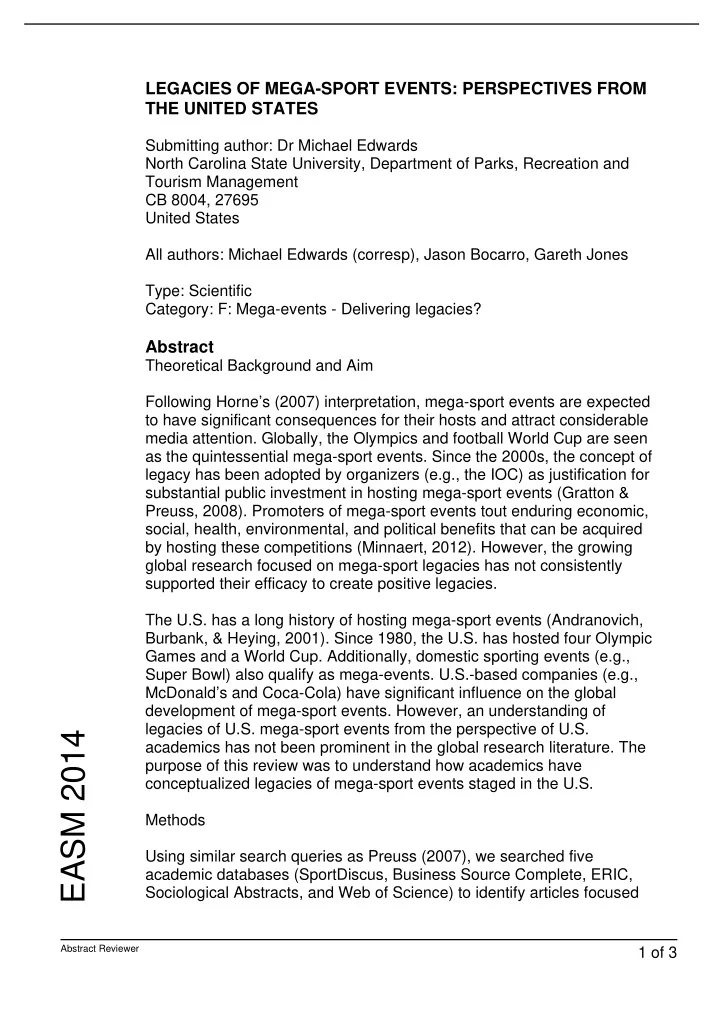

LEGACIES OF MEGA-SPORT EVENTS: PERSPECTIVES FROM THE UNITED STATES Submitting author: Dr Michael Edwards North Carolina State University, Department of Parks, Recreation and Tourism Management CB 8004, 27695 United States All authors: Michael Edwards (corresp), Jason Bocarro, Gareth Jones Type: Scientific Category: F: Mega-events - Delivering legacies? Abstract Theoretical Background and Aim� � Following Horne’s (2007) interpretation, mega-sport events are expected to have significant consequences for their hosts and attract considerable media attention. Globally, the Olympics and football World Cup are seen as the quintessential mega-sport events. Since the 2000s, the concept of legacy has been adopted by organizers (e.g., the IOC) as justification for substantial public investment in hosting mega-sport events (Gratton & Preuss, 2008). Promoters of mega-sport events tout enduring economic, social, health, environmental, and political benefits that can be acquired by hosting these competitions (Minnaert, 2012). However, the growing global research focused on mega-sport legacies has not consistently supported their efficacy to create positive legacies. � � The U.S. has a long history of hosting mega-sport events (Andranovich, Burbank, & Heying, 2001). Since 1980, the U.S. has hosted four Olympic Games and a World Cup. Additionally, domestic sporting events (e.g., Super Bowl) also qualify as mega-events. U.S.-based companies (e.g., McDonald’s and Coca-Cola) have significant influence on the global development of mega-sport events. However, an understanding of legacies of U.S. mega-sport events from the perspective of U.S. EASM 2014 academics has not been prominent in the global research literature. The purpose of this review was to understand how academics have conceptualized legacies of mega-sport events staged in the U.S.� � Methods � � Using similar search queries as Preuss (2007), we searched five academic databases (SportDiscus, Business Source Complete, ERIC, Sociological Abstracts, and Web of Science) to identify articles focused Abstract Reviewer 1 of 3
on mega-sport event legacies. Initial searches resulted in 392 articles. Filtering for articles based on country produced 76 articles from the U.S. Screening eliminated 33 articles with no topical relevance, 20 focused on events outside the U.S., and 3 focused on events that were not mega- events. The final number of articles was supplemented with one book chapter and one working paper found in our search for a final count of 20 studies. Descriptive analysis was used to identify disciplines of scholars, research type, and events studied. Content analysis was used to understand how legacies of mega-sport events were conceptualized in U.S. research. � � Results � � The preponderance of studies was published in finance and economics journals (44%) and sport/tourism management journals (28%). A large majority of studies were empirical (75%), with five conceptual papers. The empirical papers studied 28 different types of mega-sport events in the U.S. Similar to global research, the Olympics were most studied (39.2% of mega-events), followed by Super Bowl (10.7%), and top-level college sports events (10.7%). Other events included domestic professional sports’ showcase events (e.g., All-Star Games, playoffs), the 1994 FIFA World Cup, and the Ironman Triathlon. � � In 12 studies (60%), legacy was conceptualized solely as economic impact; measured via sales tax revenues, employment, trade exports, rental rates, income, or tourist revenue. Five studies (25%) had broader conceptualizations of legacy beyond immediate economic impact (e.g., host’s reputation, urban regeneration), but maintained the centrality of economic benefits. Three studies examined social impacts of U.S. mega- sport events (e.g., corporate philanthropy, training and employment programs, and sport development). � � Discussion and Implications � � The dominance of economic impact in the literature on U.S. mega-sport events was unsurprising, given both the dominance of economics and finance scholars and the capitalist approach to sport events in the U.S. Unlike other nations, cities and sport organizations in the U.S. often have EASM 2014 to operate with little national or regional financial assistance to support sport events (Andranovich et al., 2001). Thus, interests of private investors and corporate sponsors often dictate that U.S. mega-sport events prioritize economic returns. Additionally, cuts in national government spending on local economic development since the 1990s has led to entrepreneurial policies related to sport’s use to stimulate local economies and labor markets. However, similar to previous international research, few empirical studies analyzed offered evidence that mega- sport events provided significant economic legacies to host cities in the U.S. Furthermore, critics noted that business and development interests Abstract Reviewer 2 of 3
in U.S. Olympic host cities may have leveraged the pretext of legacy to more easily suppress resistance to residential displacement and gentrification. Studies that further examined social legacies of events, noted these events also often failed to live up to stated expectations. � � Nearly two decades of social science research calls into question claims made by advocates about the economic benefits to host cities of sport mega-events. U.S. research seems to confirm the dubious economic legacy of mega-sport events. Less is known about the non-economic legacies of U.S. mega-sport events; but these benefits may be of lower priority to U.S. host cities. References Andranovich, G., Burbank, M. J., & Heying, C. H. (2001). Olympic cities: Lessons learned from Mega-event politics. Journal of Urban Affairs, 23(2), 113-131. � Gratton, C., & Preuss, H. (2008). Maximizing Olympic impacts by building up legacies. The International Journal of the History of Sport, 25(14), 1922-1938. � Horne, J. (2007). The four 'knowns' of sports mega-events. Leisure Studies, 26(1), 91-96. � Minnaert, L. (2012). An Olympic legacy for all? The non-infrastructural outcomes of the Olympic Games for socially excluded groups (Atlanta 1996-Beijing 2008). Tourism Management, 33, 361-370. � Preuss, H. (2007). The conceptualisation and measurement of mega sport event legacies. Journal of Sport & Tourism, 12(3-4), 207-227. EASM 2014 Abstract Reviewer 3 of 3
Recommend
More recommend